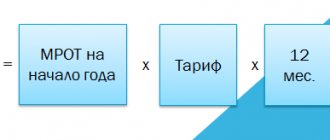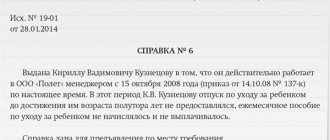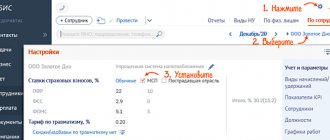Is sick leave subject to personal income tax?
There are several reasons for obtaining sick leave. The main ones are illness, injury, pregnancy and childbirth, and child care. The fact of taxation of payments depends on the reason for which the certificate of incapacity for work was issued.
In fact, compensation for sick days is the income of a working person. Consequently, all tax rules apply to income, including personal income tax. At the same time, these payments do not belong to the wage fund and therefore should not be subject to income tax.
However, these payments are also not state compensation, and therefore are also subject to all contributions provided for by law. But, if the employer takes these payments into account as the basis for calculating contributions to the Social Insurance Fund, they may not be accepted for the following reasons:
- there was a violation of current legislation. For example, the accounting department incorrectly calculated the average salary for a sick employee;
- There are no documents confirming the right to payments. In this case, it is the sick leave itself;
- The sick leave was originally issued incorrectly.
According to the current tax legislation, sick leave payments are subject to taxation in the general manner. Personal income tax is paid at the expense of the employee.
Income tax is imposed on payments received on sick leave issued on the following grounds:
- the employee himself became ill;
- his child or other relative has fallen ill and requires care;
- quarantine for infectious disease;
- injury, both at work and at home;
- the need to receive additional treatment in a hospital or sanatorium.
All sick leave payments are accrued only after the employee submits it to the accounting department. According to Art. 217 of the Tax Code of the Russian Federation, these payments can be classified as cash income, respectively:
- if a sick leave certificate is issued due to the illness of the employee himself, his child, a relative, or for another reason, then all necessary taxes, fees and contributions are calculated from the sick leave benefit received;
- if sick leave is issued due to the employee’s pregnancy and subsequent childbirth, then no taxes or fees are withheld from these payments. A woman receives 100% of her earnings for the entire period of incapacity, which depends on the number of expected children;
- if sick leave is issued on the basis that the employee was injured at work, then payments are also not subject to personal income tax or mandatory insurance contributions. This is due to the fact that the employee temporarily lost his ability to work due to the fault of management, so the state considered it wrong to charge additional amounts from him.
Every accountant should know that the amount of temporary disability benefits depends on the length of service of the employee. An employee can receive from 60% to 100% of the benefit calculated on the basis of average daily earnings. Only sick leave issued in connection with pregnancy and childbirth is paid 100%, regardless of the employee’s length of service.
The minimum period of illness is 10 consecutive days. If necessary, the therapist can extend up to 30 days. If the patient does not recover, then a special commission is convened, which can extend the period of illness to 1 year. During this time, you need to either recover or apply for disability.
Since unemployment benefits are legally classified as income, it is necessary to make appropriate charges on it:
- income tax in the amount of 13% of the amount received in hand;
- contributions to the Pension Fund and Social Insurance Fund;
- other deductions related to social needs.
There are no nuances regarding accrual, deduction or transfer to the budget. Everything happens as usual.
Important! All accruals must be made after the employee submits sick leave to the accounting department. Within 10 days, the employee must be assigned a benefit, which he will receive on the day of payment of his next salary.
If an employee falls ill after dismissal, he has the right to receive sick leave payment. Important condition! The illness must occur within 30 days after dismissal, and the employee himself must not be employed during this period. He can present sick leave to his former employer within six months after illness. However, he must also provide evidence that he did not work during this period.
As mentioned above, sick leave payments (with the exception of certain cases) are subject to taxation at the rate of 13% of the accrued amount. The employer has the right to assign additional financial assistance to its employees in connection with certain reasons for illness. For example, an additional payment up to the salary due to the illness of a child or the employee himself. If such additional payments are specified in a collective agreement or other local regulatory act, then they are not subject to taxation.
Based on all of the above, we can conclude that:
- compensation for sickness periods replaces wages, although it does not belong to the wage fund. Therefore, personal income tax must be calculated in all cases, except for the exceptions prescribed by law;
- payments are made as follows - the first 5 days are paid by the employer, and the rest of the period is paid from the “pocket” of the Social Insurance Fund. Therefore, in the first 5 days, personal income tax is paid at the expense of the sick employee, and for the rest of the period, the Social Insurance Fund pays personal income tax;
- the employee himself does not take any part in the process of calculating and paying personal income tax. He already receives the amount in his hands, from which all necessary deductions have been made.
Such rules have been in force in Russia for 10 years, and accountants have already become proficient in deducting income taxes and other contributions to the country’s budget.
Is income tax payable on sick leave?
We sorted out the insurance premiums. Is income tax deductible on sick leave? The answer will depend on the type of benefit. According to paragraph 1 of Art. 217 of the Tax Code it is necessary to withhold income tax from ordinary government benefits. That is, for example, in case of a general illness of an employee or when caring for a sick child. But, let’s say, there is no obligation to withhold personal income tax from the B&R (pregnancy and childbirth) benefit.
The personal income tax rate is set according to the norms of the Tax Code of the Russian Federation. When calculating, the benefit amount refers to the month for which the funds are paid. The employer is required to withhold income tax for the entire period of incapacity. It does not matter from what source the payment is calculated. For the first 3 days, the employer performs the calculation. In this case, the total amount of benefits to be accrued is first determined, taking into account the employee’s length of service. And then, at the working rate, personal income tax is withheld from compensation and the amount of funds to be issued “in hand” is calculated.
For the remaining days of the illness period, it is calculated directly by the Social Insurance Fund (with the participation of the region in the pilot project) or by the organization. In the second case, after checking the documentation and subject to a positive review, Social Insurance returns the entire amount of the benefit to the enterprise. That is, taking into account accrued personal income tax.
Are sick leave subject to insurance premiums?
Payments for the period of illness are made at the expense of the employer himself, as well as the Social Insurance Fund. According to Art. 9 of Law 212-FZ, the employee has no obligation to independently calculate the required contributions.
This fact is due to the following reasons:
- insurance premiums are already part of the disability benefit;
- The Social Insurance Fund should not make deductions for itself.
Based on this, we can conclude that sick leave payments are subject to income tax only. Such rules have been in force since 2009.
Since 2021, a new form of sick leave has been put into circulation, which contains the following main lines:
- the amount that the sick employee will receive from the Social Insurance Fund;
- the amount of funds that the sick employee will receive from the employer;
- a final line indicating the total value of these two indicators.
The employer must fill out these deadlines. Based on the calculations made, a payroll is generated, which indicates the amount to be paid. When the employee receives these funds in his hands, he signs this document confirming their receipt.
The calculation is made by the accounting service based on the following indicators:
- the length of service of this employee. If he has a total insurance period of less than 5 years, then he can count on only 60% of average earnings. If the total length of experience ranges from 5 to 8 years, then the employee will receive 80%, but if the experience is more than 8 years, then payment will be made in the amount of 100% of the average earnings;
- the average earnings of this employee for 1 working day. For calculations, you should take indicators for the last 2 years. It is for these purposes that upon dismissal, a certificate of average earnings is issued;
- duration of illness in days.
Are insurance premiums calculated on sick leave in 2021?
Home Insurance contributions Are sick leave contributions subject to employer expense?
Hello, I have been working as an accountant in an LLC for several months now, this is my first job. Today I encountered a problem that our employee got sick and went on sick leave. The excess of sick leave over the limit established by law is equated to the company’s wage costs and is included in expenses deductible from profit. It should be taken into account that the amount of the surcharge is subject to UST taxation.
But it must be taken into account that the employer is obliged to pay only the first three days of incapacity for work. The rest of the illness is paid for by the social insurance fund. This means that the employer must withhold and transfer personal income tax only for his period (three days). https://www.youtube.com/watch?v=Jq9htcGVg6M
For the rest of the time, income tax is paid by the social insurance fund. For benefits issued due to quarantine or the need to care for a sick child, the obligation to withhold personal income tax is assigned to the social insurance fund.
Question No. 4. In what reporting forms are accruals for sick leave and deductions for them reflected? Answer. Amounts of income tax, including those withheld from the amount of sickness benefits, are reflected in the 6-NDFL report.
Also, personal income tax is reflected in the report form 2-personal income tax. Question No. 5.
Consequently, the employer must withhold personal income tax from such amounts and transfer it to the budget. Reflection of taxation of benefits in accounts: entries Part of the sick leave paid at the expense of the employer is reflected in accounting as expenses:
- Dt20, 23.25, 26, 44 Kt70.
Accrual of UST on benefits income:
- Dt20, 23, 25, 26, 44 Kt69.
What taxes and contributions are paid on sick leave: answers to pressing questions Question No. 1.
All payments for sick leave are made on the day the salary is issued. Therefore, the employer has only 10 days to receive funds from the Social Insurance Fund.
There are terms for withholding 13% of accrued payments.
- If money is issued through a cash register, then the tax is paid in advance.
- When transferring funds to a bank card, personal income tax payment is carried out the next day.
- If wages depend on the company’s revenue, then the deadline for paying the tax ends the next day after the money is issued.
Help: if an employer pays for sick leave from his own funds, then he calculates personal income tax only for three days of compensation. The insurance fund calculates and pays its share independently.
Having found out about sick leave at the expense of the employer and whether it is subject to insurance contributions, it is quite easy to make a payment.
If these conditions are met, the FSS reimburses the employer’s expenses for ensuring payment of the slip, starting from the 4th day for the employee’s illness and in full when opened for a relative or child. The employer has the right in its internal local documentation to provide for the possibility of additional payment of benefits up to 100%, with the additional difference paid in full to the insured person at the expense of the company.
From the amount of the surcharge, the employer is obliged to calculate insurance premiums at established rates and transfer them to the budget:
- 2.9% - for social insurance for disability and maternity - up to an annual income of 815,000 rubles. (this maximum base is set for 2021 for social insurance contributions);
- 5.1% - for medical;
- 22% - for pension up to an annual income of 1,021,000 rubles.
During this period, a benefit in the amount of 12,000 rubles was accrued. Income for April is 25,000 rubles, including the amount of temporary disability benefits.
When calculating sick pay, only those payments to the individual from which these contributions were transferred are taken into account. That is, in essence, payments under the certificate of incapacity for work are made at the expense of the previously listed insurance amounts. Important! Is it necessary to deduct contributions from accrued state social benefits?
No, it’s not necessary, such social benefits are not subject to insurance rates. This rule applies to both that part of the benefit that is paid at the expense of the Social Insurance Fund - sick days, starting from the fourth, and that which is issued at the expense of the employer - the first three days. Insurance premiums are not subject to both benefits accrued for sick leave in connection with the illness of the insured person himself, and for certificates issued to care for sick relatives - minor children and adult family members.
2 tbsp. 3 of the Law of December 29, 2006 No. 255-FZ). Deductions are expenses for labor functions. The following days, until the end of the sick leave, payments are made by the Social Insurance Fund. Other cases (caring for a sick family member, pregnancy and childbirth, etc.) provide for full payment from the funds of this Fund in accordance with the law. You should know that sick leave is not subject to contributions to the Pension Fund and compulsory medical insurance. The obligation to provide monetary compensation due to an employee’s incapacity for work is regulated by the norm of Article No. 183 of the Labor Code of the Russian Federation.
- date of registration;
- Full name, gender and date of birth of the patient;
- reasons for issuing the document;
- information about the person's employer;
- information about inpatient treatment;
- period of illness;
- Full name of the doctor;
- end date of the period of incapacity.
A doctor may refuse to provide a document to a patient if he has not found any signs of disability - this is the only reason for refusal. If the patient does not agree, he can write a complaint to the head physician or other senior person of the hospital. Not all employers know whether funds from sick leave are deducted as insurance premiums in 2021.
An employee’s income is subject to insurance premiums and other taxes, but with insurance premiums for sick leave, not everything is so simple. Insurance According to the law, the first 3 days of sick leave are paid by the employer, and the remaining days by the Social Insurance Fund.
As a result, the employee receives money from the employer for his illness, but it cannot be called a sick leave benefit due to the lack of compensation from the fund. It turns out that the employer paid for the employee’s absence from work from his own funds, and is obliged to transfer insurance contributions to the budget from the benefits paid. There is only one way out in this situation - to voluntarily agree with the employee on the return of the money issued due to an error.
Payment deadline If payment for sick leave is still subject to insurance contributions, then they must be transferred by the 15th day of the next month inclusive. If this day falls on a weekend or non-working holiday, the payment deadline is shifted - funds must be transferred on the next business day. To make a payment, fill out a payment order. Example for 2021 Initial data: An employee got sick.
Officials emphasize that if the company has not received compensation from the social insurance fund, then the payment cannot be considered a benefit exempt from contributions. And in other cases, when receiving income, it is necessary to “share” with the state.
Are sick leave insurance premiums calculated in the event of a work injury? The legislation also exempts the employer from collecting insurance premiums in the event of accidents at work and occupational injuries and illnesses. It does not imply an insurance premium and payment for treatment, since it relates to compensation payments.
Features of the insurance period The amount of payments for the period of temporary disability is determined by the employee’s insurance experience. The concepts of work experience and insurance experience are not identical.
Having considered the issue, we came to the following conclusion: Insurance premiums are not charged for the amount of temporary disability benefits paid at the expense of the employer for the first three days of temporary disability. Rationale for the conclusion: In accordance with Part 1 of Art. 7 of the Federal Law of July 24.
2009 N 212-FZ “On insurance contributions to the Pension Fund of the Russian Federation, the Social Insurance Fund of the Russian Federation, the Federal Compulsory Medical Insurance Fund” (hereinafter referred to as Law N 212-FZ), the object of taxation of insurance contributions is payments and other remunerations accrued by payers of insurance contributions in favor of individuals within the framework of labor relations and civil contracts, the subject of which is the performance of work and the provision of services.
Is sick leave subject to income tax?
Sick leave payments are subject to income tax. Although these funds do not belong to the wage fund, personal income tax must be charged on them. This is done as follows:
- 5 days of sickness are paid by the employer. It is the employer who calculates, withholds and pays tax on these payments;
- subsequent days are paid by the Social Insurance Fund. Now this fund has the responsibility to pay tax.
As in all other cases, the employee has nothing to do with the transfer of taxes to the budget. This is done by the tax agent - the Social Insurance Fund and the employer.
Is income tax collected on sick leave?
A disability document is a form issued by the attending physician to a patient during treatment for injuries, various diseases, and so on. When the treatment process is completed and the employee is ready to begin performing his duties, the sheet is handed over to the accountant or head of the organization. This is done in order to correctly calculate monetary compensation for the period when the performance of direct duties was impossible. The amount paid is legally considered the person's income and is therefore subject to income tax.
How is income tax withheld from sick leave?
When receiving a medical document about an employee’s illness, the accountant, first of all, needs to fill out those columns that are required by law. In the “Total Accrued” section, the entire amount including payments is indicated. After this, income tax is withheld. The tax rate is 13%, which is established by law. The interest rate remains unchanged.
The principles of withholding personal income tax in this case:
- Personal income tax is calculated carefully;
- Contributions are made to the Pension Fund;
- A report is prepared for the Social Insurance Fund.
You need to know what restrictions on the timing of personal income tax transfers exist:
- When paying through a bank - no later than the day of transfer;
- In case of cash payment - no later than the day when the benefit was received by the employee;
- When paying from cash, the transfer is made no later than the day the money is received.
How is income tax on sick leave calculated?
Income tax calculations are carried out by the company's accountant. He calculates the amount of accruals to the employee and the state.
Procedure for accrual and deduction of payments:
- They look at how many days the person was actually sick, and indicate this figure on the certificate of incapacity for work. It is for these days that benefits will be accrued;
- Calculate the employee’s average earnings over the last two years and divide by the number of days in two years;
- They clarify the employee’s insurance experience, since the amount of payment depends on it;
- Calculate what average daily earnings are taken into account when calculating sick leave benefits;
- The total payment amount is calculated by multiplying the number of sick days by the employee’s average earnings, and subtracting 13%.
The company pays only for the first 3 days of incapacity for work, and the rest is compensated by the Social Insurance Fund. Therefore, the employer transfers to the budget only the amount based on his accruals, that is, three days. The remaining days are calculated by the FSS.
Are sick leave contributions to the Pension Fund?
As already mentioned, payments for sick leave are made at the expense of the Social Insurance Fund (in whole or in part). That part of the sick leave that is paid from this fund is not subject to any mandatory insurance contributions.
In paragraph 1 of Art. 9 of Law No. 212-FZ states that sick leave payments are benefits received from the state fund. Therefore, it is impossible to charge and collect insurance premiums from these benefits.
In some cases, several days of illness of the employee are paid from the employer’s “pocket”. These payments are also not subject to insurance premiums due to the “state nature” of benefits.
In paragraph 1 of Art. 20. 2 of Law 125-FZ states that “sickness” payments are also not subject to contributions for “injuries”.
Is sick leave subject to alimony?
A child always needs financial support, regardless of whether the parent is older or not. Since sick leave payments are a citizen’s income, alimony is withheld from them.
But there is an important nuance! Alimony in favor of a child or other relative is collected from “sickness” payments only if there is a court decision or court order, that is, an enforcement case has been opened and a writ of execution has been issued. It can be issued on the basis of:
- alimony agreement that spouses enter into among themselves, but one decides not to fulfill it;
- a writ of execution issued on the basis of a court decision or court order.
Therefore, no other document can be the basis for withholding alimony. For example, a parent transfers money to another parent for the maintenance of their common child. They did not sign or draw up any documents. Thus, payment is made on the basis of an oral agreement. One parent gets sick, and the other writes a letter to him at work demanding that he pay him a certain amount as alimony. No deduction should be made based on this letter. It is illegal!
In order for the withholding from payments on a certificate of incapacity to be legal, the following steps must be taken:
- enter into an alimony agreement or file a claim in court demanding collection;
- wait for the court's decision on the case;
- transfer this decision or court order to the bailiff service;
- receive a writ of execution;
- submit this document to the accounting department of the enterprise where the alimony payer works.
If you take such actions, then alimony will be paid every month on the day of payment of wages, regardless of whether the alimony payer was sick in the current month or not.
Temporary disability can only affect the amount of alimony received. For example, an employee on sick leave receives only 60% of his average earnings. He was ill for almost a month, therefore, he received much less wages than for a whole month of work. If alimony is collected as a percentage of income, the recipient will receive a much smaller amount.









